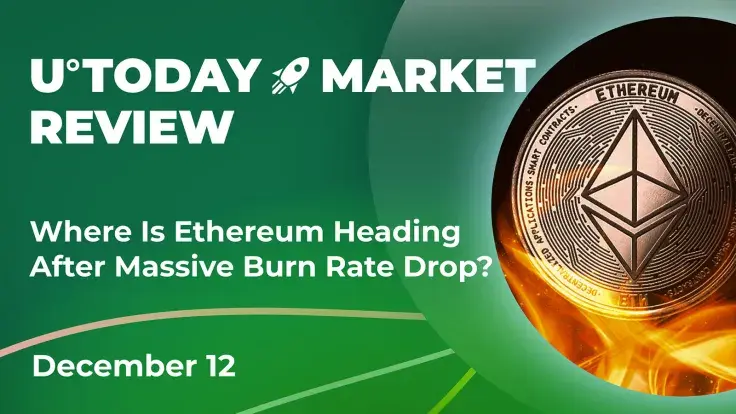
Disclaimer: The opinions expressed by our writers are their own and do not represent the views of U.Today. The financial and market information provided on U.Today is intended for informational purposes only. U.Today is not liable for any financial losses incurred while trading cryptocurrencies. Conduct your own research by contacting financial experts before making any investment decisions. We believe that all content is accurate as of the date of publication, but certain offers mentioned may no longer be available.
The new week on cryptocurrency markets started off with a mild drawdown as the majority of assets moved in the red zone, losing 1-2% of their value on average. However, some assets are facing increased selling pressure due to fundamental flaws users highlighted recently.
Ethereum not getting any support
After the massive drop of Ethereum's burn rate, the second biggest cryptocurrency on the market has not been getting any support from investors, as ETH is still consolidating at the local resistance level and has not yet broken through despite numerous attempts.
The trading volume also suggests the lack of traction of Ethereum on the market. The second biggest cryptocurrency's trading volume has been descending for more than a month now.
The decreasing burn rate results from suppressed network activity, which explains why Ethereum has been so anemic on the cryptocurrency market. Unfortunately, it is not clear when the network activity of Ethereum will return to levels we saw back in 2021. Two massive sources of network activity for Ethereum had been the NFT and DeFi industries.
TRX faces criticism over USDD
USDD, yet another algorithmic stablecoin backed by volatile assets on Tron, has recently become the subject of a dispute in the cryptocurrency community. Most investors worry about the state of stable assets after it briefly depegged to $0.97 without volatility spikes on the market or the appearance of excessive selling pressure.
Deploying more capital - steady lads https://t.co/55pra5wQMi?from=article-links https://t.co/CexyaBy2hx?from=article-links
— H.E. Justin Sun🌞🇬🇩🇩🇲🔥 (@justinsuntron) December 12, 2022
Justin Sun recently announced the deployment of additional capital, but the lack of aneffect on the market price of USDD shows that the spiral has already been hyped too much and the outflow of funds might push the value of USDD down too much to save the stablecoin with 200% overcollateralization.
However, the stated 200% collateralization does not mean that stablecoin is backed 1:1 in USD value. Most of those assets are volatile, and by deploying them on the market, Sun is entering the Luna/UST trap. With the decreasing value of volatile assets used by Tron to collateralize USDD, there will be no assets left to support the value of USDD and will practically see Luna 2.0 but with a lesser effect on the market.
Shiba Inu's relief bounce
The 900% burn spike on Shiba Inu we highlighted yesterday did not pass unnoticed on the market, causing a strong bounce off of the critical price level at $0.000008. The drop below it would put Shiba Inu close to a multi-month bottom and cause even more losses among SHIB holders that have been dealing with one of the lowest profitability levels on the market.
The spike in the burn rate could be the beginning of a positive trend that would put more SHIB tokens out of circulation, decreasing the selling pressure on the token. Unfortunately, risk appetite among investors is still at an extremely low level, which decreases the possibility of a recovery rally on assets like Shiba Inu.


 Dan Burgin
Dan Burgin Vladislav Sopov
Vladislav Sopov